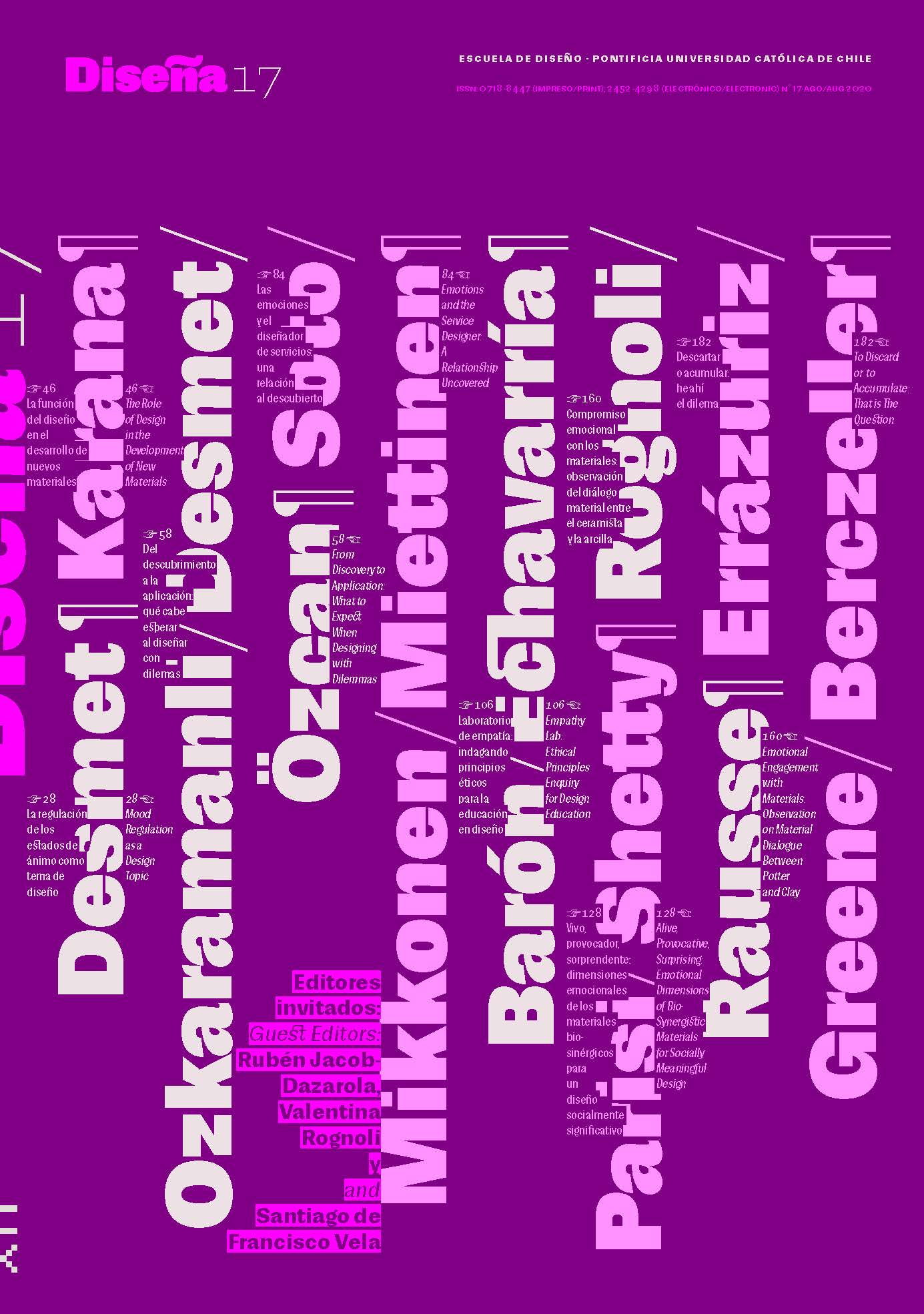Editorial: Design and Emotions Against Systems of Power, Ideology, and Control
Main Article Content
Downloads
Article Details

This work is licensed under a Creative Commons Attribution-ShareAlike 4.0 International license.
COPYRIGHT NOTICE
All contents of this electronic edition are distributed under the Creative Commons license of "Attribution-ShareAlike 4.0 Internacional" (CC-BY-SA). Any total or partial reproduction of the material must mention its origin.
The rights of the published images belong to their authors, who grant to Diseña the license for its use. The management of the permits and the authorization of the publication of the images (or of any material) that contains copyright and its consequent rights of reproduction in this publication is the sole responsibility of the authors of the articles.
References
ASAD, M., & LE DANTEC, C. A. (2015). Illegitimate Civic Participation: Supporting Community Activists on the Ground. Proceedings of the 18th ACM Conference on Computer Supported Cooperative Work & Social Computing, 1694–1703. https://doi.org/10.1145/2675133.2675156
ASKINS, K., & SWANSON, K. (2019). Holding onto Emotions: A Call to Action in Academia. Emotion, Space and Society, 33, 100617. https://doi.org/10.1016/j.emospa.2019.100617
BEATTY, A. (2013). Current Emotion Research in Anthropology: Reporting the Field. Emotion Review, 5(4), 414-422. https://doi.org/10.1177/1754073913490045
BERICAT, E. (2015). The Sociology of Emotions: Four Decades of Progress. Current Sociology, 64(3), 491–513. https://doi.org/10.1177/0011392115588355
BERLANT, L. (2004). Compassion: The Culture and Politics of an Emotion. Routledge.
BODDICE, R. (2018). The History of Emotions. Manchester University Press.
CAHILL, C. (2007). The Personal is Political: Developing New Subjectivities through Participatory Action Research. Gender, Place & Culture, 14(3), 267-292. https://doi.org/10.1080/09663690701324904
COSTANZA-CHOCK, S. (2018a). Design Justice, A.I., and Escape from the Matrix of Domination. Journal of Design and Science. https://doi.org/10.21428/96c8d426
COSTANZA-CHOCK, S. (2018b). Design Justice: Towards an Intersectional Feminist Framework for Design Theory and Practice. Proceedings of the Design Research Society 2018. https://papers.ssrn.com/sol3/papers.cfm?abstract_id=3189696
DAVIDSON, J., & MILLIGAN, C. (2004). Embodying Emotion Sensing Space: Introducing Emotional Geographies. Social & Cultural Geography, 5(4), 523-532. https://doi.org/10.1080/1464936042000317677
DESMET, P. M. A. (2002). Designing Emotions. Delft University of Technology.
DESMET, P. M. A., HEKKERT, P., & HILLEN, M. (2003). Values and Emotions; An Empirical Investigation in The Relationship Between Emotional Responses to Products and Human Values. Proceedings of the 5th European Academy of Design Conference. http://www.ub.edu/5ead/PDF/9/Desmet.pdf
DESMET, P. M. A., & ROESER, S. (2015). Emotions in Design for Values. In J. van den Hoven, P. E. Vermaas, & I. van de Poel (Eds.), Handbook of Ethics, Values, and Technological Design: Sources, Theory, Values and Application Domains (pp. 203-219). Springer Netherlands. https://doi.org/10.1007/978-94-007-6994-6_6-1
DILLON, A. (2001). Beyond Usability: Process, Outcome, and Affect in Human Computer Interactions. The Canadian Journal of Information and Library Science, 26(4), 57-69. https://doi.org/10.26153/tsw/3402
DOMBROWSKI, L. (2017). Socially Just Design and Engendering Social Change. ACM Interactions, 24(4), 63-65. https://doi.org/10.1145/3085560
DOMBROWSKI, L., HARMON, E., & FOX, S. (2016). Social Justice-Oriented Interaction Design: Outlining Key Design Strategies and Commitments. Proceedings of the 2016 ACM Conference on Designing Interactive Systems, 656–671. https://doi.org/10.1145/2901790.2901861
ILLOUZ, E. (2007). Intimidades congeladas: Las emociones en el capitalismo. Katz.
ILLOUZ, E. (2009). Emotions, Imagination and Consumption: A New Research Agenda. Journal of Consumer Culture, 9(13), 377–413. https://doi.org/10.1177/1469540509342053
KEYES, O., HOY, J., & DROUHARD, M. (2019). Human-Computer Insurrection: Notes on an Anarchist HCI. Proceedings of the 2019 CHI Conference on Human Factors in Computing Systems, Paper No. 339, pp. 1–13. https://doi.org/10.1145/3290605.3300569
KHOVANSKAYA, V., DOMBROWSKI, L., HARMON, E., KORN, M., LIGHT, A., STEWART, M., & VOIDA, A. (2018). Designing Against the Status Quo. ACM Interactions, 25(2), 64–67. https://doi.org/10.1145/3178560
KIESEWETTER, R. (2020). Publishables. Diseña, 16, 58-87. https://doi.org/10.7764/disena.16.58-87
LUPTON, D. (1998). The Emotional Self: A Sociocultural Exploration. Sage.
LUTZ, C. A. (1990). Engendered Emotion: Gender, Power, and the Rhetoric of Emotional Control in American Discourse. In C. A. Lutz & L. Abu-Lughod (Eds.), Language and the Politics of Emotion (pp. 69-91). Cambridge University Press.
LUTZ, C. A., & ABU-LUGHOD, L. (1990). Introduction: Emotion, Discourse, and the Politics of Everyday Life. In C. A. Lutz & L. Abu-Lughod (Eds.), Language and the Politics of Emotion (pp. 1-23). Cambridge University Press.
MARKUSSEN, T., KNUTZ, E., & LENSKJOLD, T. U. (2016). Design Activism as a New Method for Inquiring into Mixed Emotions in Uncomfortable Social Interaction. In P. M. A. Desmet, S. Fokkinga, G. Ludden, N. Cila, & H. van Zuthem (Eds.), Proceedings of the 10th International Conference on Design & Emotion (pp. 256-265). The Design & Emotion Society.
NORMAN, D. A. (2003). Designing Emotions Pieter Desmet [Review]. The Design Journal, 6(2), 60-62. https://doi.org/10.2752/146069203789355444
NUSSBAUM, M. C. (2013). Political Emotions: Why Love Matters for Justice. The Belknap Press of Harvard University Press.
OVERBEEKE, C. J., & HEKKERT, P. (Eds.). (1999). Proceedings of the First International Conference on Design & Emotion. Delft University of Technology.
REZAI, M., & KHAZAEI, M. (2017). The Challenge of Being Activist-Designer. An attempt to Understand the New Role of Designer in the Social Change Based on Current Experiences. The Design Journal, 20(sup1), S3516-S3535. https://doi.org/10.1080/14606925.2017.1352855
ROSALDO, M. Z. (1980). Knowledge and Passion: Ilongot Notions of Self & Social Life. Cambridge University Press.
Rosenwein, B. H. (2010). Passions in Context—Problems and Methods in the History of Emotions. https://www.passionsincontext.de/index.php/?id=557
SMYTH, T., & DIMOND, J. (2014). Anti-oppressive Design. Interactions, 21(6), 68–71. https://doi.org/10.1145/2668969
TURNER, J. H. (2009). The Sociology of Emotions: Basic Theoretical Arguments. Emotion Review, 1(4), 340-354. https://doi.org/10.1177/1754073909338305

